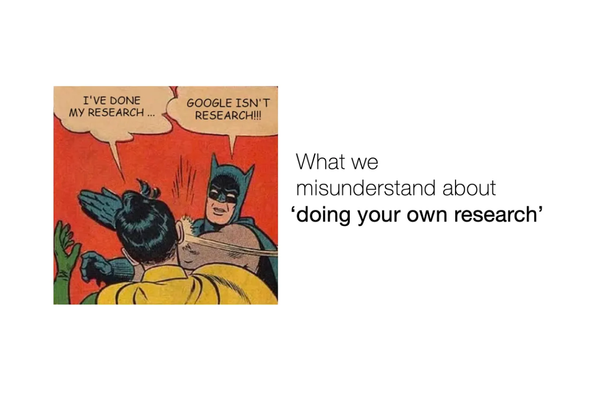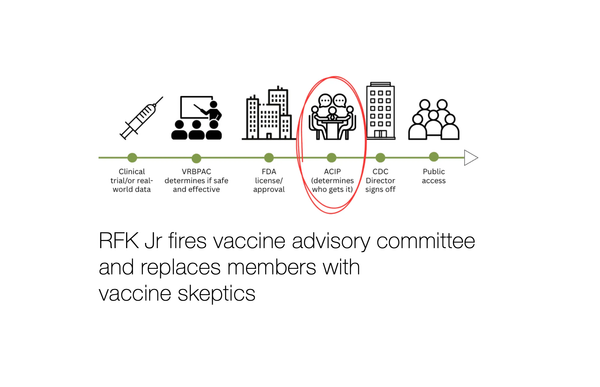RFK Jr and the rise of a new form of germ theory denial

There is a growing, concerning movement undermining one of the most well established scientific theories there is: germ theory, the idea that germs – like viruses and bacteria – cause disease.
But it's subtle.
Outright denial of germ theory is still a fringe idea: very few deny that viruses and bacteria exist. Rather, it's the effect of germs – whether germs are the true cause of an illness – that is increasingly being called into question.
What germ theory is and isn't
When germ theory was first proposed in the 1800s, scientists didn't have microscopes or other modern scientific tools, and there was genuine debate over how infectious diseases like cholera were transmitted – some thought it was microscopic germs, others thought it was "bad vapors" (miasma theory). But that debate has been long settled. Microscopic germs like Vibrio cholerae (the bacteria that causes cholera), measles, influenza, and polio all cause infections that make people sick.
A slightly different take on John Snow's classic public health cholera dataset, looking at nearest neighbor clustering using the cool new ggpointdensity geom from @LPMKremer. And of course, #rayshader's 3D ggplots😀
— @tylermorganwall.bsky.social (@tylermorganwall) September 25, 2019
Gist: https://t.co/BrzyCV7wg0#rstats pic.twitter.com/Q3jFpc9AaP
Animated rendering of John Snow's famous cholera map in which he discovered a cluster of cholera cases near the water pump in 19th century London, one of the early findings leading to the discovery that cholera was caused by a water-borne bacterium. Animation by Tyler Morgan-Wall.
Of course, there is more to germs than just disease. Some germs are good for us – like the many germs that make up the microbiome in our gut. And some germs cause disease only some of the time, like the MRSA bacteria I am almost certainly colonized with as a healthcare worker. And sometimes, other health conditions make people more susceptible to infectious germs – like those with diabetes or conditions that weaken the immune system.
Germ theory does not say all germs are bad, nor does it say germs are responsible for every disease known to humans, nor does it say that any exposure to a germ is a guarantee of illness. It says that certain germs can cause infections that make people sick. And when that happens, the germ really is to blame.
A new subtle form of germ theory denial
But this idea is starting to be rejected and replaced with a new, inaccurate view of why infections happen and what we should do about them.
This new version of germ theory denial still acknowledges that germs are real, but believes they're not all that much of a threat for a healthy individual, nor the real problem causing disease. Instead, when someone catches an infection, the person's immune system and lifestyle are blamed – an unhealthy diet, lack of exercise, exposure to "environmental toxins", or underlying conditions are allegedly the "true" cause of disease because they damaged the immune system.
Said another way, it's the belief that infections don't pose a risk to healthy people who have optimized their immune system. And if you want to prevent infections, vaccines aren't the solution, becoming healthier through nutrition, exercise, and dietary supplements are.
This version of germ theory denialism has become quite common. It's what drove the "comorbidity fallacy" during the pandemic – the belief that COVID wasn't really what was killing people, underlying health conditions were actually to blame. It also drove the rumor that if you just eat right and exercise enough, there's no reason to get vaccinated, because your immune system will be sufficiently "boosted." More recently, it can be seen in the rumor that vaccines didn't really cause the decline in vaccine-preventable illnesses like measles and polio during the 20th century, better nutrition and sanitation were the true drivers.
RFK Jr's view on germs
In his recent book "The Real Anthony Fauci," RFK Jr. promotes this inaccurate view of germs. He laments that “germ theory” has dominated over the long-debunked 19th-century “miasma theory” which he defines as “preventing disease by fortifying the immune system through nutrition and by reducing exposures to environmental toxins and stresses." This appears to be a novel definition of miasma theory, as historical records define it as the belief that diseases like cholera were transmitted through "bad air" emanating from corpses or corrupting matter.
According to this definition of miasma theory, germs only pose a threat if the immune system has already been damaged by poor diet and environmental toxins. He summarizes with a false dichotomy about measles: “When a starving African child succumbs to measles, the miasmist attributes the death to malnutrition; germ theory proponents (a.k.a. virologists) blame the virus. The miasmist approach to public health is to boost individual immune response.”
This overly simplistic, false view explains RFK Jr's approach to public health. He seems to believe that germs like measles are not actually a threat for a healthy person, and can be overcome by nutritional and environmental interventions that "boost" the immune system. This likely explains why for the current measles outbreak, he has been far more enthusiastic about advocating for cod liver oil than vaccination.
This, of course, is abysmally misguided, as any pediatrician or historian can tell you.
A kernel of truth wrapped in a lie
This version of germ theory denialism is particularly sneaky, because it contains a kernel of truth. It's true that a person's general health (which is impacted by diet, exercise, age, etc.) can influence how well they will fight off infections. In the case of the starving African child, both inadequate nutrition and the measles infection need to be addressed; we don't have to choose.
The critical lie that makes this view so dangerous is the belief that if you become healthy enough and optimize your nutrition, infectious diseases are no longer a threat. This is simply not true. A healthy 19-year-old can still die from meningitis, even if they’re the star athlete. A fit, healthy 70-year-old can still die from the flu, even if their diet and exercise are perfect. A healthy 6-year-old child can still die from measles, even if they were perfectly fed and didn't have any underlying conditions.
"Boosting the individual immune response" through nutrition is not anywhere near a sufficient public health response to a measles outbreak. Getting enough cardio and greens is not going to stop bird flu. A balanced diet, exercise, and sanitation are all incredibly important for keeping us healthy, but they are not a magic cure for infectious disease. Infections have historically been the top killer of humans, and if we forget that and abandon the tools we've created to keep them at bay, they will be sure to remind us again.
Kristen Panthagani, MD, PhD, is a resident physician and Yale Emergency Scholar, completing a combined Emergency Medicine residency and research fellowship focusing on health literacy and communication. In her free time, she is the creator of the medical blog You Can Know Things and author of Your Local Epidemiologist’s section on Health (Mis)communication. You can subscribe to her website below or find her on Substack, Instagram, or Bluesky. Views expressed belong to KP, not her employer.




